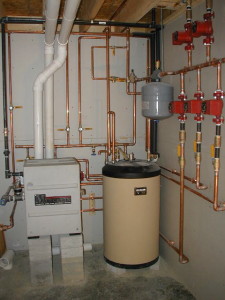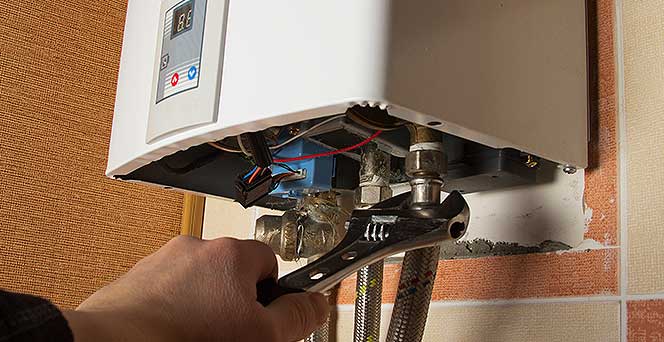We've stumbled on this great article on What Do You Do When Your Water Heater Bursts? directly below on the internet and felt it made perfect sense to share it with you here.

Whether it is situated in the cellar or a separate room, busted water heating units can cause anxiety. Having no warm water supply is also troublesome.
Shut Off Source Of Power
Prior to calling the plumber, shut down a gas hot water heater by turning the temperature level dial. This is generally located on top of the thermostat. Switch off the circuit breaker if you have a model that runs on electrical power. This will certainly stop electrocution, especially if there is a leak as water is a conductor. Typically, the burner shuts off when the water strikes a specific temperature. However with a damaged container, it may malfunction. Sufficing off ensures you remain risk-free.
Cut Off the Cold Water Supply
Cut off the storage tanks tap water supply from the resource. When your storage tank is in good problem, the cool water stops filling up when the tank is full. If you can not discover it or reach it, you need to transform off that primary water supply line outside your property.
Call the Plumber
After doing the first 2 security actions, you have to call your plumber to come right away to deal with a burst hot water heater. Nevertheless, bear in mind that your unit will not simply collapse considerably overnight. There are normally signs that your aging water heater has debris buildup in the inside. Remember of the following:
- Rusty water originating from the hot water tap
- Strange sounds from within that program sedimentation
- Leaking connections
- Pooled water under the storage tank because of little pinholes
- Instead, as quickly as you spot these indications, have a professional come to inspect your water heater say thanks to. Typically, water heating systems have a lifespan of about 8 to 12 years.
Clean Up Residential or commercial property
After calling the plumber, record damage by keeping in mind as well as photos so you can assert your homeowner's insurance policy. From there, start the prompt cleanup. Take out any type of important valuables to avoid further saturating. Then, remove any type of standing water to avoid mold as well as mildew development. If you have a submersible water pump, use that to drain pipes the water. Or else, the traditional container approach will also work. Attempt to wipe out whatever, consisting of walls and wall surfaces. If you have an electrical fan and also dehumidifier, keep them going to maintain air distributing. This will assist deter mold development.
Bear in mind, if you notice any type of concerns with your water heater, call the pros right away. You can not take this issue gently due to the fact that a defective thermostat can increase water temperature to a hazardously high degree, leading to accidental burns.
Whether it is located in the basement or a separate room, broken water heaters can cause tension. Before calling the plumber, shut off a gas water heater by turning the temperature level dial. After doing the initial 2 security steps, you should call your plumber to come right away to repair a ruptured water heating unit. If you have a submersible water pump, utilize that to drain pipes the water. Remember, if you observe any kind of concerns with your water heating system, call the pros right away.
8 REASONS YOUR HOT WATER HEATER IS NOT WORKING & HOW TO FIX
Water Heater Problems & Solutions
Loose or Damaged In-Line Valve
Unlike a water leak near the bottom of your water tank, a water leak on top of your system can be easily fixed. A common cause of water tank leaks includes a loose in-line valve. This is a handle that is located at the top of the water tank that is engineered to activate or deactivate the flow of water. To fix this problem, you will need to secure the nut that holds the ball or in-line valve in its location. If the leak becomes more severe once it is tightened, you will be required to travel to your local hardware store to purchase a new in-line valve for your water heater.
Damaged Pressure Relief Valve
Most types of water heaters are equipped with a pressure relief valve that is engineered to discharge pressure from the water tank when it becomes too high. If this valve on top of your water heater begins to leak, we recommend purchasing a new one online or from your local store. The process of removing and replacing pressure relief valves is not complicated.
No Warm Water
If you have an electric water heater in your home, the most typical cause of a lack of warm water is a broken heating element. Your water heater is equipped with two heating elements that are tasked with heating incoming water in the water tank. Once a heating element begins to malfunction, you will have little to no hot water to use for showering, cleaning, and laundry.
Low Supply of Hot Water
Are you continuously running out of warm water? This issue may be a byproduct of a cracked dip tube. This tube is engineered to push cold water to the base of your water tank to be heated. Once a crack or hole begins to form in the dip tube, the incoming supply of cold water may be released near the top or middle of your tank. As a result, the cold water on top of the tank will be sent to the faucets and showers in your house. This hot water heater problem can only be fixed by replacing the dip tube on your system. Since the process of installing a new dip tube is complex, we recommend calling a certified technician for help.
A low supply of warm water may also be a signal of excess sediment buildup in your water tank. As your water heater reaches the middle of its life cycle, minerals in water including magnesium and calcium will begin to collect at the base of the water tank. As the minerals continue to grow, there will be less room in the water tank to store hot water. To resolve this problem, flush your water heater to remove the excess minerals.
Water is Too Warm or Cold
If the water in your shower feels uncomfortable hot or cold, you can adjust the temperature of your water by changing the settings on your thermostat. Setting the temperature to 120 degrees Fahrenheit may help you save money on your utility bills. This is an excellent temperature to use if you’re worried about scalding or skin irritation. Does this temperature feel too cold? You may also adjust the thermostat to 140 degrees Fahrenheit to make your showers more pleasant. If your hot water heater is not working when you change the temperature, this is an indicator of a broken thermostat. Immediately find a certified plumbing or heating contractor in your area to repair or replace your thermostat.
Low Water Pressure
Low water pressure is not always caused by a malfunctioning water heater. If you live in an older home with smaller water pipes, the flow of water will be restricted prior to reaching our kitchen or bathroom skins. The only way to eliminate this hot water heater problem is to connect new ¾-inch water lines to your system. Another type of problem that may negatively impact your water pressure includes calcium deposits in water pipes.
As magnesium and calcium begin to form in your pipes, the diameter of your water lines will become smaller. As a result, the warm water from your water heater will not be able to travel in an efficient manner to your sinks or appliances. Since the process of replacing water pipes includes removing drywall, an average homeowner that does not have a plumbing license will not be able to fix this hot water heater problem.
https://www.wmhendersoninc.com/blog/8-reasons-your-water-heater-is-not-working-how-to-fix/

Hopefully you liked our topic about What Do You Do When Your Water Heater Bursts?. Thanks a ton for taking a few minutes to read our piece. Sharing is caring. You never know, you might be doing someone a favor. Thank-you for your time invested reading it.
Explore
Comments on “Key Steps Residential Property Owners Should Take When Handling Faulty Hot Water Systems”